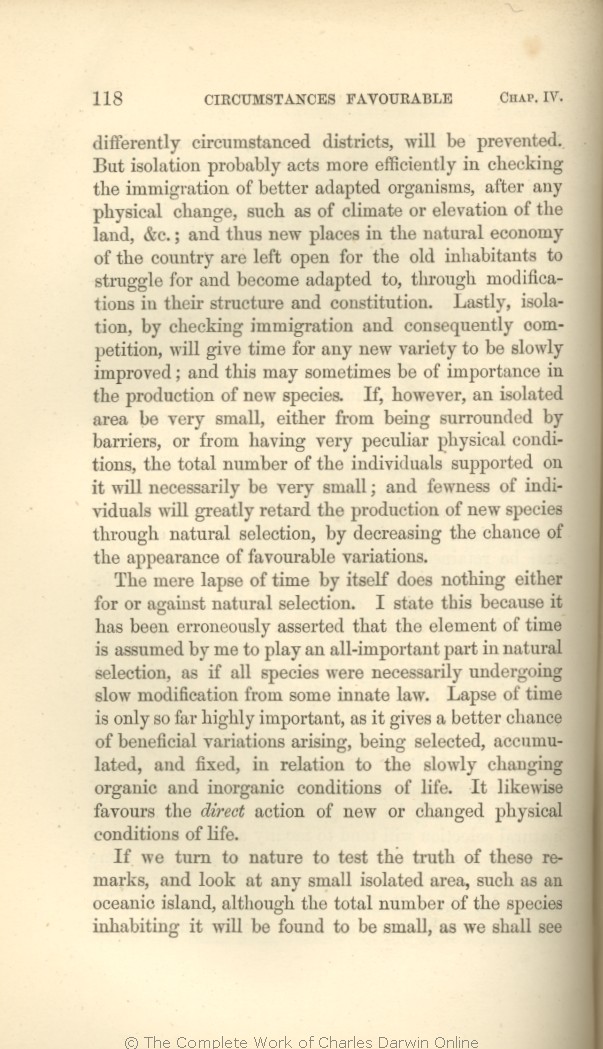districts, | districts, 1859 1860 1861 1866 | | districts 1869 1872 |
| will 1859 1860 1861 1866 | | will, 1869 1872 |
| be 1859 1860 1861 1866 |
| also, be 1869 |
| also, be thus 1872 |
| 3 blocks not present in 1859 1860 1861 1866; present in 1869 1872 | | Moritz Wagner has lately published an interesting essay on this subject, and has shown that the service rendered by isolation in preventing crosses between newly
formed varieties is probably greater even than I have
supposed.
But from reasons already assigned I can by no means agree with this naturalist, that migration and isolation are necessary for
the formation of new species.
The importance of isolation is likewise great in preventing, after any physical change in the conditions,
such as of climate, elevation of the land, &c., the immigration of better adapted organisms; and thus new places in the natural economy of the district are
left open for
the old inhabitants
to struggle for and become adapted to.
|
| for 1866 | | for, 1859 1860 1861 |
| modifications 1861 1866 | | modifica- tions 1859 1860 |
| isolation, 1859 1860 1861 1866 | | isolation 1869 1872 |
| by checking immigration and consequently competition, 1859 1860 1861 1866 |
| OMIT 1869 1872 |
| any 1859 1860 1861 1866 | | a 1869 1872 |
| slowly 1859 1860 1861 1866 1869 | slowly 1872 |
| improved; 1859 1860 1861 1866 1869 | | improved 1872 |
| and 1859 1860 1861 1866 1869 |
| at a slow rate; and 1872 |
| importance in the production of new species. 1859 1860 1861 1866 1869 |
| much importance. 1872 |
| individuals supported on it will necessarily be very 1859 1860 1861 1866 |
| inhabitants will be 1869 1872 |
| fewness of individuals will greatly 1859 1860 1861 1866 |
| this will 1869 1872 |
| chance 1859 1860 1861 1866 | | chances 1869 1872 |
| the appearance of 1859 1860 1861 1866 1869 |
| OMIT 1872 |
| variations. 1859 1860 1861 1866 | | individual differences. 1869 | | variations arising. 1872 |
|
The mere lapse of time by itself does
nothing | nothing 1861 1866 1869 | | nothing, 1872 |
| is 1861 1866 | | has been 1869 1872 |
| natural selection, 1861 1866 | | modifying species, 1869 1872 |
| species 1861 1866 |
| the forms of life 1872 |
| OMIT 1869 |
| undergoing 1861 1866 1872 | | under- going 1869 |
| slow modification from 1861 1866 |
| change through the action of 1869 |
| change through 1872 |
| highly 1861 1866 | highly 1869 1872 |
| as 1861 1866 |
| and its importance in this respect is great, that 1869 1872 |
| being 1861 1866 1869 |
| and of their being 1872 |
| accumulated, 1861 1866 1872 | | increased, 1869 |
| fixed, 1861 1866 1869 | | fixed. 1872 |
| relation 1861 1866 1869 | relation 1872 |
| the 1861 1866 1869 | the 1872 |
| slowly 1861 1866 1869 | slowly 1872 |
| changing 1861 1866 1869 | changing 1872 |
| organic 1861 1866 1869 | organic 1872 |
| and 1861 1866 1869 | and 1872 |
| inorganic 1861 1866 1869 | inorganic 1872 |
| conditions 1861 1866 1869 | conditions 1872 |
| life. 1861 1866 1869 | life. 1872 |
| favours 1861 1866 1869 |
| tends to increase 1872 |
|
direct
1861 1866 | | definite 1869 | | direct 1872 |
| new or changed physical 1861 1866 |
| the 1869 |
| the physical 1872 |
| life. 1861 1866 1869 |
| life, in relation to the constitution of each organism. 1872 |
|









